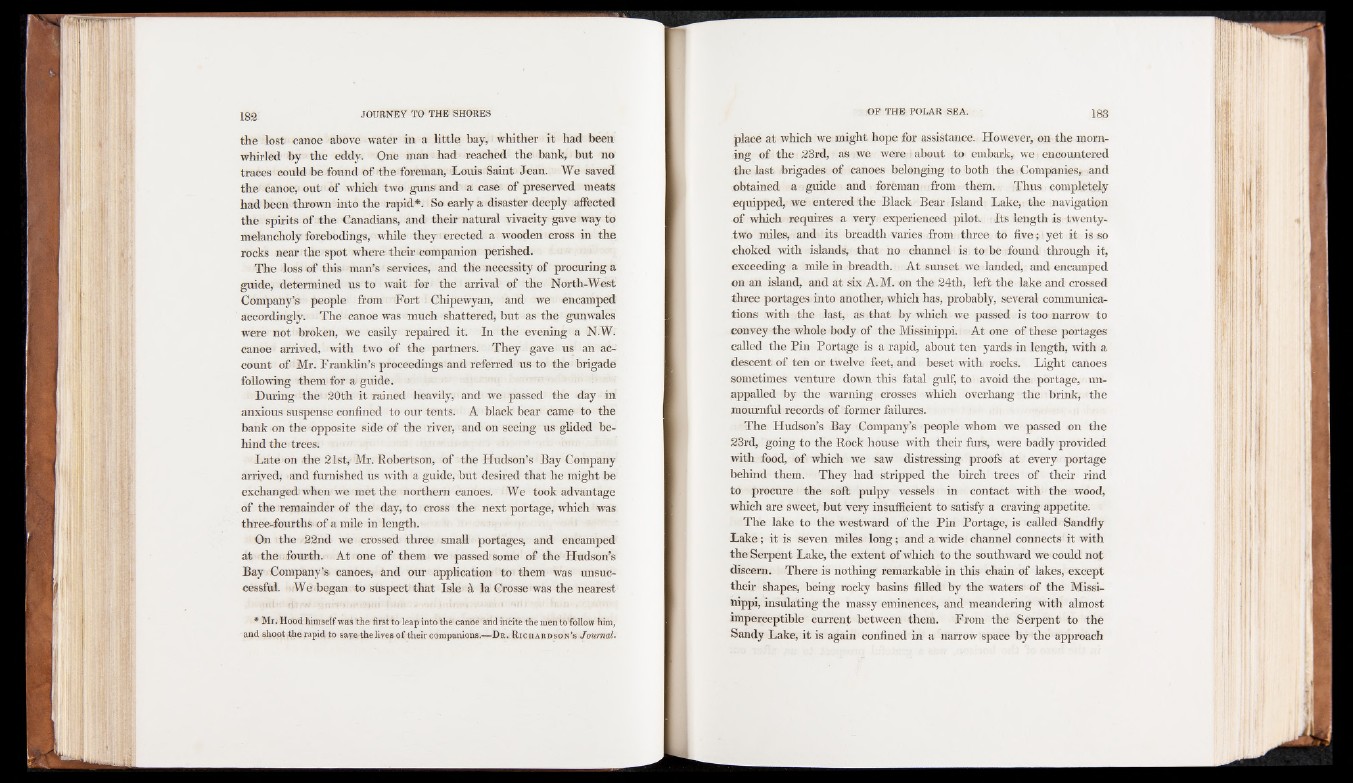
the lost canoe above water in a little bay, whither it had been
whirled by the eddy. One man had reached the bank, but no
traces could be found of the foreman, Louis Saint Jean. We saved
the canoe, out of which two guns and a case of preserved meats
had been thrown into the rapid*. So early a disaster deeply affected
the spirits of the Canadians, and their natural vivacity gave way to
melancholy forebodings, while they erected a wooden cross in the
rocks near the spot where their companion perished.
The loss of this man’s services, and the necessity of procuring a
guide, determined us to wait for the arrival of the North-West
Company’s people from Fort Chipewyan, and we encamped
accordingly. The canoe was much shattered, but as the gunwales
were not broken, we easily repaired it. In the evening a N.WV
canoe arrived, with two of the partners. They gave us an account
of Mr. Franklin’s proceedings and referred us to the brigade
following them for a guide.
During the 20th it rained heavily, and we passed the day in
anxious suspense confined to our tents. A black bear came to the
bank on the opposite side of the river, and on seeing us glided behind
the trees.
Late on the 21st, Mr. Robertson, of the Hudson’s Bay Company
arrived, and furnished us with a guide, but desired that he might be
exchanged when we met the northern canoes. We took advantage
of the remainder of the day, to cross the next portage, which was
three-fourths of a mile in length.
On the 22nd we crossed three small portages, and encamped
at the fourth. At one of them we passed some of the Hudson’s
Bay Company’s canoes, and our application to them was unsuccessful.
We began to suspect that Isle & la Crosse was the nearest
* Mr. Hood himself was the first to leap into the cande afld incite the men to'follow him,
and shoot the rapid to save the lives of their companions.—Dr. R i c h a r d s o n ’s Journal.
place at which we might hope for assistance. However, on the morning
of the 23rd, as we were | about to embark, we encountered
the last brigades of canoes belonging to both the Companies, and
obtained a guide and foreman from them. Thus completely
equipped, we entered the Black Bear Island Lake, the navigation
of which requires a very experienced pilot. Its length is twenty-
two miles, and its breadth varies from three to five; yet it is so
choked with islands, that no channel is to be found through it,
exceeding a mile in breadth. At sunset we landed, and encamped
on an island, and at six A.M. on the 24th, left the lake and crossed
three portages into another, which has, probably, several communications
with the last, as that by which we passed is too narrow to
convey the whole body of the Missinippi. At one of these portages
called the Pin Portage is a rapid, about ten yards in length, with a
descent of ten or twelve feet, and beset with rocks. Light canoes
sometimes venture down this fatal gulf, to avoid the portage, un-
appalled by the warning crosses which overhang the brink, the
mournful records of former failures.
The Hudson’s Bay Company’s people whom we passed on the
23rd, going to the Rock house with their furs, were badly provided
with food, of which we saw distressing proofs at every portage
behind them. They had stripped the birch trees of their rind
to procure the soft pulpy vessels in contact with the wood,
which are sweet, but very insufficient to satisfy a craving appetite.
The lake to the westward of the Pin Portage, is called Sandfly
Lake; it is seven miles long; and a wide channel connects it with
the Serpent Lake, the extent of which to the southward we could not
discern. There is nothing remarkable in this chain of lakes, except
their shapes, being rocky basins filled by the waters of the Missinippi,
insulating the massy eminences, and meandering with almost
imperceptible current between them. From the Serpent to the
Sandy Lake, it is again confined in a narrow space by the approach